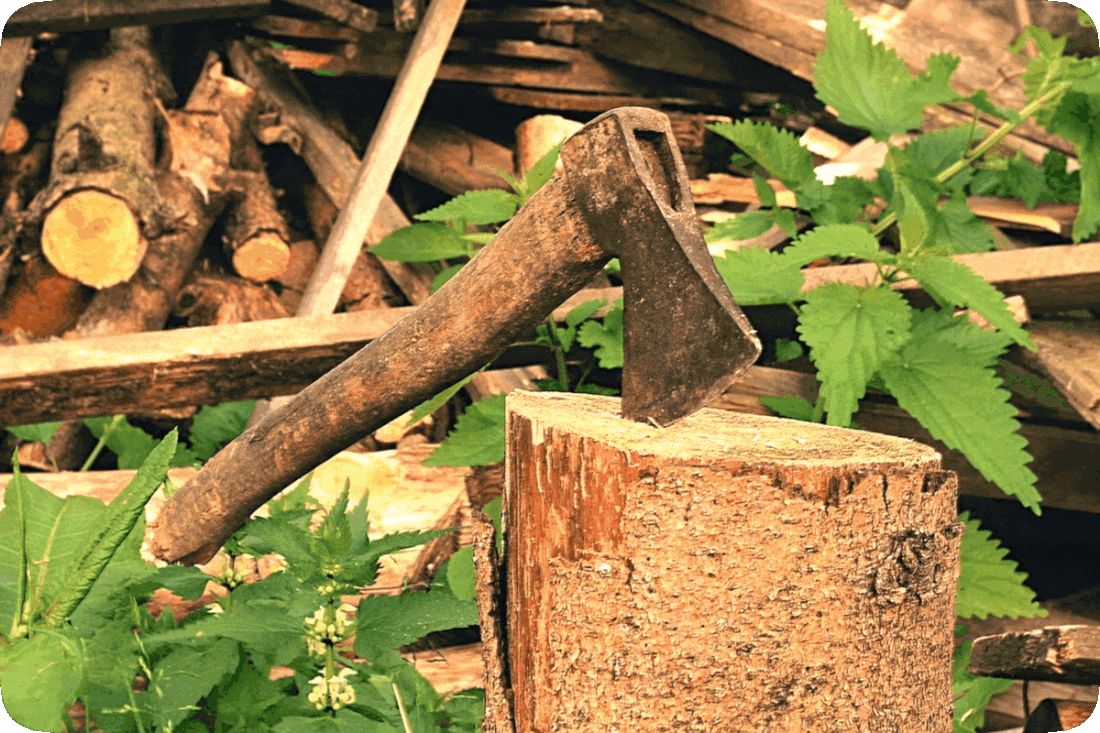Old Bill . . . Ne’er-Do-Well
It was sixty years ago that Old Bill taught me a lesson I have never forgotten. I was unappreciative then. But now, although he has been gone for many years, I still need to acknowledge my debt, which I can repay now only with a heartfelt “Thank you.”
Old Bill was a ‘ne’er-do-well.’ He was the ax, hammer, and hatchet handle-maker for the farm community I lived in as a boy. His customers had no doubts about the quality of his handles, insisting they were superior to any factory-made ones. This loyalty, though, did not keep them from calling him a ‘ne’er-do-well.’
To these God-fearing people, clustered around the two churches in Pine Creek Township, a ‘ne’er-do-well’ was anyone who refused to live by the established ‘work ethic.’ To them, such a person was both a shame and a threat. It was not considered a shame to be poor and at times to need some help from a neighbor. Disgrace came to the whole community, though, when a person was able to work and support his family, but was too lazy to do so. If this were a man, he became a threat because of parents’ fears that their boys might be attracted to take up his shiftless ways.
So, it was natural that we boys were discouraged, if not exactly forbidden, from being seen with Old Bill. We all liked to go fishing with him, because he taught us where to find fish, and also a better way to bait a hook. Much as our parents enjoyed the fish we brought home, they were still skeptical about the wisdom of allowing us to go with him very often.
The ’work ethic’ we lived under expected a boy to become responsible for a few small chores by the time he was able to see over the third board in the pigpen fence. Gradually these chores were increased, leaving less and less time for play. By the time he became a young man of twenty-one, he was ready to take a summer job with a neighboring farmer. He would begin the first of March and work until after Thanksgiving Day, for thirty dollars a month plus board and room. After several years of this he usually married one of the neighborhood girls, and the two sets of parents would help them rent eighty acres and start farming for themselves. Yes, life in my boyhood community was well-programmed from the time of a person’s birth.
Old Bill - I never knew his real name - subscribed to very little of this. He had a wife, whom I cannot remember seeing, and several sons who left home as soon as they were able to get away. He, seemingly, had no ambition toward expanding his ax handle business. It was only now and then that he would take a job helping one of the farmers.
Bill was quite content to beg a hickory tree from my grandpa’s timber, every two or three years. This kept him in seasoned wood to make enough handles to supply those who depended on him for them. Business was never very brisk. I never figured out where the food and clothes came from.
At twelve, already somewhat rebellious toward this accepted pattern of life, I was sure I wanted to do something other than farm. It was possible that making ax handles might not be as hard as farming. This was the reason that I, willing to risk parental disapproval, slipped away one hot summer afternoon and went to Old Bill’s shop.
I walked in and announced, “I want to make an ax handle.”
“Hmm,” Old Bill looked me over and drawled, “I don’t rightly think ya kin. ’Tain’t easy, ya know. But I guess ya kin try, ef ya do a good job, an’ finish it.”
He placed a piece of hickory in the workbench vise, handed me a spokeshave, and told me to get started. I didn’t think it would be a very hard job. But after ten minutes of trying to smooth that hard piece of hickory, I was ready to quit. But I had failed to reckon with a side of Old Bill I had never seen before. He shooed me back to the workbench and gave me a lecture I still remember.
“Don’ ya ever, boy,” he began, “start a job ya ain’t plannin’ ter finish. Ya got to sweat over everything ya do. Don’t think yer pappy ain’t sweatin’ over ever’ load o’ hay and ever’ shock o’ oats or corn he sets up. Git back thar’ an’ get ter work!”
Well, I sweated over that ax handle for the longest six hours of my life. Both hands were blistered, and my legs were almost too tired to carry me home. If anyone had tried to put the handle I made into an ax, he would never have been able to hit twice in the same place.
I left the community right after high school and entered the state university. Later I went into retail business. During many tense and sweaty times, I again saw Old Bill’s ax handle shop, and a twelve-year-old boy with blistered hands, and tears in his eyes, laboring over a piece of hickory. This picture was always enough to send me back to face going uphill, and in no small measure helped to bring such success as I achieved.
by Fred J. Miller: as published in “Sunshine Magazine” (September 1973), Volume L, Number 9, pages 8 through 10
Frederick John ‘Fred’ Miller was born on 19 January 1901 in Polo, Ogle County, Illinois, United States of America. He was married to Blanche Ione Snell on 24 June 1927. Mr. Miller was at various times a farmer, a carpenter, a house painter, a grocery clerk, a meat cutter, and a grocery store owner. After selling his grocery store in 1958, he spent 14 years as a Christian pastor of the Church of the Brethren in Hartford City, Indiana. In 1972, he and his wife moved to the Timbercrest Retirement Home, where he took up woodcarving as a pastime. Frederick John ‘Fred’ Miller passed on at 88 years of age on 9 February 1989 in North Manchester, Wabash County, Indiana, United States of America and rests in Servia, Wabash County, Indiana, United States of America.






































































































